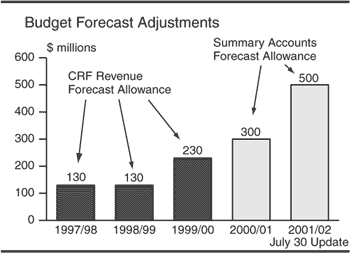|
FORECAST
ALLOWANCE UPDATE
Introduction
Beginning with the 1997 budget, government has used prudent
forecasting practices to recognize the uncertainties in predicting
future economic developments. By explicitly lowering revenues or
increasing the forecast deficit, government increased the
probability of meeting its budget target.
In 1997/98 and 1998/99, government used prudent revenue
forecasts. For 1997/98, the revenue forecast was reduced by
approximately $130 million. Without this reduction, final revenues
which were only $1 million under budget, would have been $131
million below budget. In 1998/99, a revenue forecast allowance of
$130 million was subtracted from the revenue forecast. Final
revenues, which were under budget by $135 million, would have been
$265 million below target without the allowance.
In the last two years, accelerating economic performance
produced fiscal results well ahead of forecast. For 1999/2000, a
revenue forecast allowance of $230 million was applied. Revenues
were $1.69 billion over budget, $1.46 billion over the unadjusted
forecast. In 2000/01, with the formal inclusion of Crown
corporations into government’s bottom-line, government expanded
the scope of the forecast allowance to the aggregate
surplus/deficit forecast, to cover the combined variances of
government revenues, expenditures, and Crown corporation net
income forecasts. Last year, government forecast a deficit of $1.3
billion after adding a $300 million forecast allowance. However,
the results for the 2000/01 fiscal year now show a $1.5-billion
surplus, largely due to significant increases in energy commodity
prices and stronger-than- expected economic performance.
Economic and Fiscal Update Forecast Allowance
In this Economic and Fiscal Update, government will
continue to apply a forecast allowance to the summary accounts
bottom-line, to account for risks to revenue, expenditure and
Crown corporation forecasts and to increase the likelihood of
meeting the forecast target. The Fiscal Review Panel recommended a
$730-million forecast allowance, primarily to cover certain
spending pressures. In this Update, government has provided
additional spending of $455 million, including a further $140
million in the Contingencies vote, to cover the additional
forecast risk. As well, the forecast allowance has been
increased by $200 million to a total of $500 million, 1.3 per cent
of total government and Crown coporation revenues, or 2.2 per cent
of CRF revenue. This allowance covers a wide range of possible
circumstances, some of which may be offsetting, such as:
|
—
|
below (or above) forecast economic growth;
|
|
—
|
weaker (or higher) than-expected energy prices, due to
changes in the regulatory environments, markets and weather
conditions;
|
|
—
|
lower (or higher) forest revenues, recognizing the
uncertainty associated with the outcome of the softwood
lumber countervail duty investigation;
|
|
—
|
total CRF expenditures exceeding (or falling short of)
budget, for example due to higher-than- expected costs of
legal settlements;
|
|
—
|
lower (or higher) profits/losses in Crown corporations,
for example due to the effect of a dryer-than-normal winter
on BC Hydro’s net income forecast;
|
|
—
|
other difficult-to-predict changes such as year-end
accounting adjustments; and,
|
|
—
|
changes in government policy.
|

Adjustment to Economic and Fiscal Update Deficit Forecast
The 2001/02 fiscal forecasts in the Economic and Fiscal
Update are based on government policies as at July 23, 2001.
The forecasts also incorporate the following:
|
—
|
the economic forecast documented in Part 1, the British
Columbia Economic Review and Outlook;
|
|
—
|
specific determinants of CRF revenue such as sales of
Crown land drilling rights, timber harvest levels, and asset
sales, that are not directly specified in the economic
forecast. These assumptions are detailed in Table 2.6;
|
|
—
|
cost drivers affecting CRF expenditures, such as income
assistance caseloads, forest fires, legal claims, health
care demands and interest rates, that are detailed in Table
2.9. As well, the Contingencies (All Ministries) and New
Programs Vote is included as part of the Estimates
approved by the Legislature to help manage spending changes
through the year; and
|
|
—
|
factors affecting the financial results of Crown
corporations, such as accident rates (ICBC) and electricity
prices and water levels (BC Hydro), that are listed in Table
2.11.
|
Overall, the government considers the assumptions presented in
the Economic and Fiscal Update to be within the range of
reasonable expectations, and that in aggregate they result in the
most likely forecast of the summary accounts deficit. As a result,
the effect of the $500-million forecast allowance is to increase
the deficit from the most likely forecast of $1.0 billion to $1.5
billion.
|

